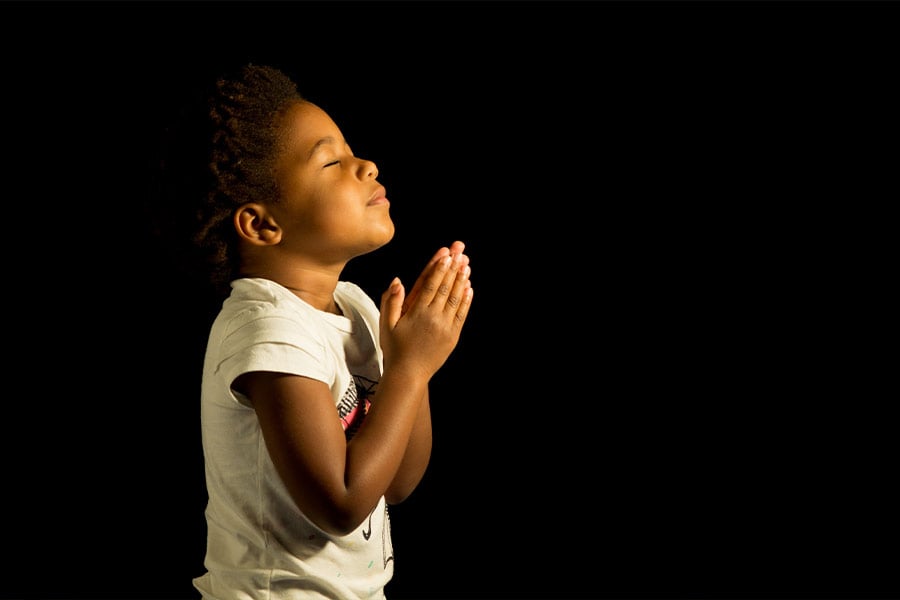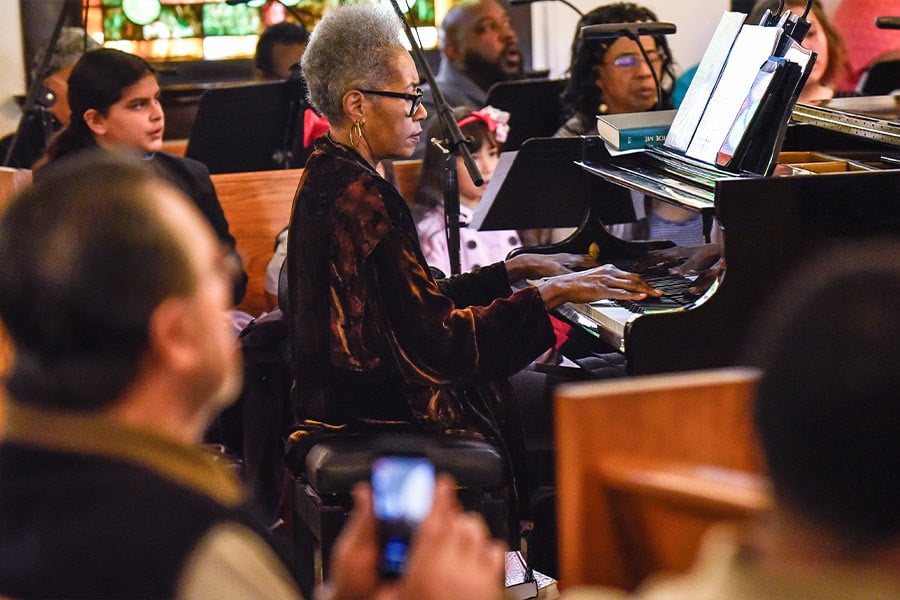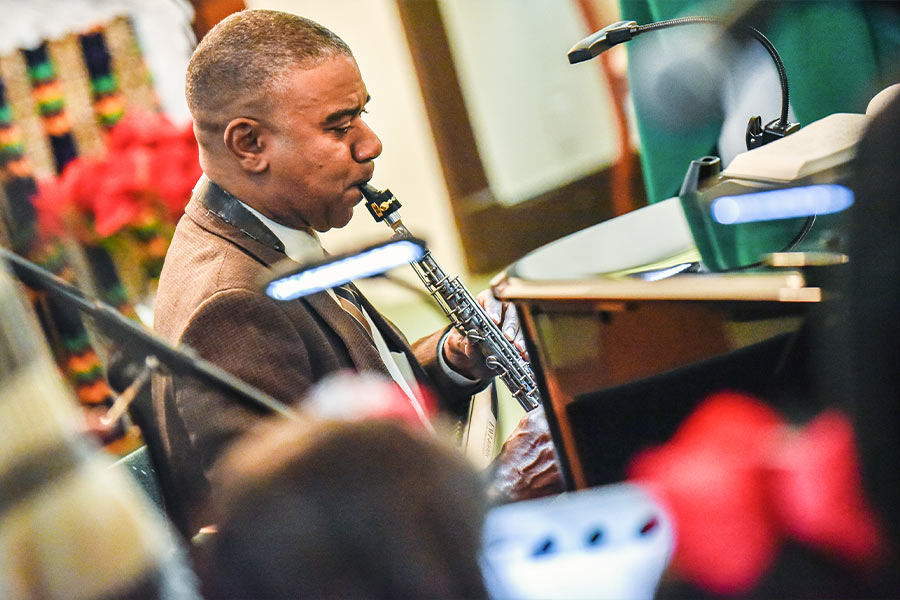Love overcomes hate

Amid worldwide protests about the killing of George Floyd and racial inequality, Bishop Michael Olson brought the diocese together for a Mass for the repose of the soul of George Floyd, for the consolation of his family, and for peace and an end to civil discord.
In his homily at the June 4 Mass, Bishop Olson stated, “Justice is the need and responsibility of everyone. Peace is the need and responsibility of everyone. We can only achieve them if we work towards them together and we cannot achieve them without recognizing that justice and peace come from God and we need Him.”
The struggle to achieve justice and peace on this earth is ongoing.
In reflecting on George Floyd’s death and the ensuing protests against racism, Donald Walker, Jr., parishioner of Our Mother of Mercy Parish in Fort Worth, recalled the history of racism in our country.
“We keep being reminded about where we were at earlier times in history by events like this,” he said. “We need to not just address George Floyd’s death but also the circumstances that led to his death.”
“Our country was founded as a country that condoned slavery. It goes back to that, and includes other peoples who suffered as well,” he added.
“We need to have courage,” he said. “Not the absence of fear, but how we respond in the face of fear. How you choose to push forward even though something is fear-inducing. How you press on.”
One who suffered at the hands of racism, yet pressed on, was Venerable Augustus Tolton, the first African American priest in the U.S.
Born into slavery in 1854, he overcame years of ridicule, exclusion, slander and racist acts, even by other Catholics, in order to answer his call to priesthood. He attended seminary in Rome because no American seminary would accept a black man, and he returned to build and pastor the first African American parish in Chicago.
Last June, Pope Francis advanced Father Tolton’s path to sainthood by declaring him “venerable,” meaning he lived a life of heroic virtue. Today, Fr. Tolton’s heroic virtue, tenacity, and perseverance serve as a model for all Catholics who strive to avoid the sin of racial prejudice.

“The Catholic Church deplores double slavery — that of the mind and that of the body. She endeavors to free us of both,” Fr. Tolton told the first Black Catholic Congress in 1889.
Fr. Tolton died on July 9, 1897, the 29th anniversary of the 14th Amendment, which granted citizenship and equal civil rights to emancipated slaves.
Though some Catholic laity and even clergy have been complicit with segregation and discrimination since the Civil War, the Church always has viewed racism as contrary to God’s love and will for humanity. In the several decades following Fr. Tolton’s death, the U.S. bishops issued strong statements and pastoral letters against both overt and subtle systemic forms of racism. Priests, laity, and religious did their part to fight discrimination, too.
Like Fr. Tolton, Josephite Father Narcisse Denis became the founding pastor of the first African American parish in Tarrant County — Our Mother of Mercy Parish in 1929.
According to parish records, the Ku Klux Klan was active in Fort Worth, and often targeted the parish and Fr. Denis by burning fiery crosses on church property. Fr. Denis pressed on, repeatedly replacing a sign he had installed on the church steeple because someone kept shooting it out.
That hostility didn’t prevent three Sisters of the Holy Spirit from opening a school for 50 neighborhood children the following year. In 2008, the Diocese of Fort Worth built a new Our Mother of Mercy school building for $2.5 million and assisted with $2.3 million in operating expenses so the school could continue serving the community until 2016.
In 2018, the school transitioned to become Cristo Rey Fort Worth High School at Our Mother of Mercy in order to provide a quality, college preparatory education to disadvantaged youth in the Diocese of Fort Worth. The new high school thrived and needed room for expansion. However, challenges posed by surrounding structures viewed as historic prompted the school’s move to its current larger site in southwest Fort Worth. There it continues to honor the educational legacy of its predecessor.
Despite the abolition of slavery in 1865, discrimination against blacks continued, especially in the South. The journey toward racial equality inched forward for nearly a century, from Reconstruction and Jim Crow laws to “separate but equal” amendments and eventually the Civil Rights Act of 1964.
Catholics pressed on against racism during the 1960s, when current Our Mother of Mercy parishioner Erma Bonner-Platte took protesters into her Goldsboro, N.C. home, fed them, washed their clothes, and gave them a place to rest before they returned to sit at a Woolworth “whites only” lunch counter.
Bonner-Platte remembers when African Americans were turned away from all-white parishes. She had been teaching at a small segregated public school in northeast Texas, her first job out of college, and had walked to the local parish for Mass. The next day, the superintendent of schools told her she was not allowed to attend the all-white parish.
“I had never been told I couldn’t go to Mass,” Bonner-Platte said.
Zenobia Collins, director of Liturgy and Music at Our Mother of Mercy, recalls a similar experience. When she visits her Mississippi hometown today, she attends Mass at the same parish that 50 years ago would have turned her away.

Choir director Zenobia Collins plays the piano during Sunday Mass, on Jan. 26, 2020 at Our Mother of Mercy Parish in Fort Worth. (NTC/Ben Torres)
“You just knew not to go there,” Collins said. “There might not have been a sign saying, ‘You can’t come in,’ but you knew you weren’t welcome and if you did, you certainly wouldn’t be able to take Communion.”
In spite of the challenges and inspired by their faith, the parish community of Our Mother of Mercy blossomed over the decades. Originally made up of only about a dozen members meeting in a chapel that was formerly an abandoned drug store, it grew into a church community that has produced many leaders in diocesan and national Catholic organizations, in government, business, and education.
In 2015, Bishop Olson selected Our Mother of Mercy Church as the chief pilgrimage church for the Year of Mercy called by Pope Francis, in order to highlight the importance of God’s mercy among those most marginalized and overlooked.
“Our Mother of Mercy was established in the midst of racial segregation to evangelize the African American community — Catholic and non-Catholic through education and faithful witness,” Bishop Olson said. “In so doing, it also evangelized the broader and dominant white Protestant community, and the broader Catholic community, itself a minority subject to exclusion and prejudice, about the evils of racial prejudice.
He continued, “Many African Americans of many different religious traditions overcame unjust exclusion from mainstream society because of the education offered them through the mission of the Catholic Church and its schools. Our Mother of Mercy is now located in a neighborhood that is no longer predominantly African American, yet our challenge remains for us to not turn inward in fear but to be present also in predominantly African American neighborhoods for the evangelization of today.”
Collins collaborates on worship music with several other choir directors for the Annual Memorial Mass for Dr. Martin Luther King, Jr., which has been celebrated at a different parish in the Diocese of Fort Worth every year since 1986, the year that Dr. King’s birthday was first celebrated as a national holiday.
Reflecting on her six years directing the integrated and multicultural choir for the Memorial Mass, she said the decision to celebrate the Mass at a different parish each year is one way the diocese has responded to racism.
“For me, the most important thing is that it brings about unity in the community,” she added. “It allows us to get to know each other better, to enjoy each other and experience the differences in our cultures and our music.”
Bishop Olson told the NTC that it’s important to celebrate the annual Mass honoring the memory and mission of Dr. King because “even though slavery ended well over 150 years ago and segregation ended in law 50 years ago, we still have a residue of distrust and fear. This celebration reminds us to make conscious our common humanity.”

Donald Walker, Jr., plays during a song of worship at Sunday Mass, Jan. 26, 2020 at Our Mother of Mercy Parish in Fort Worth. (NTC/Ben Torres)
In addition to more culturally inclusive liturgies and “preaching about racism as unjust,” Bishop Olson said the diocese also has vigorously addressed racism in its schools, its athletic programs, and with its commitment to educate African American children.
“But we can do better,” he added. “We also need to look more clearly at those structures of racism that we take for granted and overlook … perhaps unspoken biases, or fears of people of different colors, cultures, or ethnic backgrounds.”
Bishop Shelton Fabre of the Diocese of Houma-Thibodaux, Louisiana, was this year’s guest homilist for the Jan. 11 Memorial Mass. He told the diverse congregation gathered at St. Joseph Parish in Arlington that although civil legislation “allowed us to make the progress we have made to this point in combatting racism … there is much work to do.”
Bishop Fabre said, “While governments can and must create laws that respect the civil rights of people regardless of race, the aspect of the struggle against racism that you and I as people of faith alone can accomplish is this conversion of hearts.”
Bishop Olson said that call to convert hearts includes our own conversion by “looking with intentionality in our own lives and where we see it, confess it and repent from it.”
For Walker, conversion of hearts begins with relationships among people working together across demographic lines.
“Sometimes it just takes people working together and being together in the trenches to understand that we’re not really all that different,” he said.
Walker said that though overt acts of prejudice are easy to spot, “there might be implicit bias … that we’re not even aware of and it does impact our overall behavior.”
“One of the final battlegrounds for true equality and acceptance for all,” he continued, “is the one where we have to tackle some of the feelings that we’re not even aware that we have.”
Walker said moving forward against racism means putting the problem “under a spotlight.”
“It dwells and hides where people can’t see it, especially when there’s this ongoing narrative that it doesn’t exist,” he said.
Recent demonstrations have turned a spotlight on racial inequality around the world.
“A lot of times people try to deny that there’s a racial divide in this country and that there’s systemic racism in the application of justice,” Walker recently told the NTC. “But with the death of George Floyd, there is no denying that racism is still out there for all to see.”
Bishop Olson acknowledged the sin of racism in his June 13 pastoral letter, urging the faithful of the diocese to remember, “We are each and all children of the one true and living God.”
According to the bishop, the first step to following the command to love God and love our neighbor begins “with the humble recognition that none of us are God. God has designed us to need Him and to need each other, with all of our diversity and our common human nature.”
